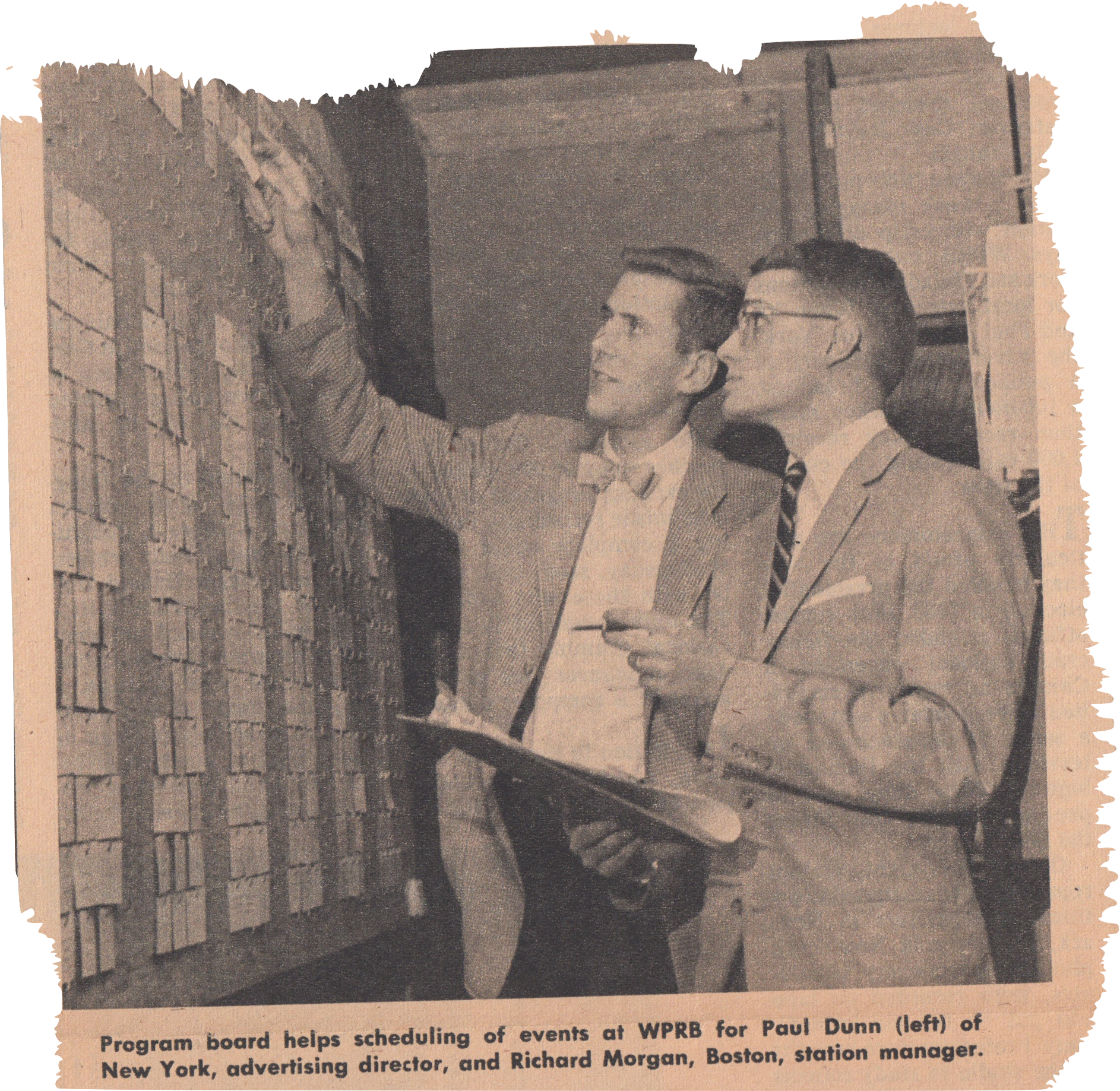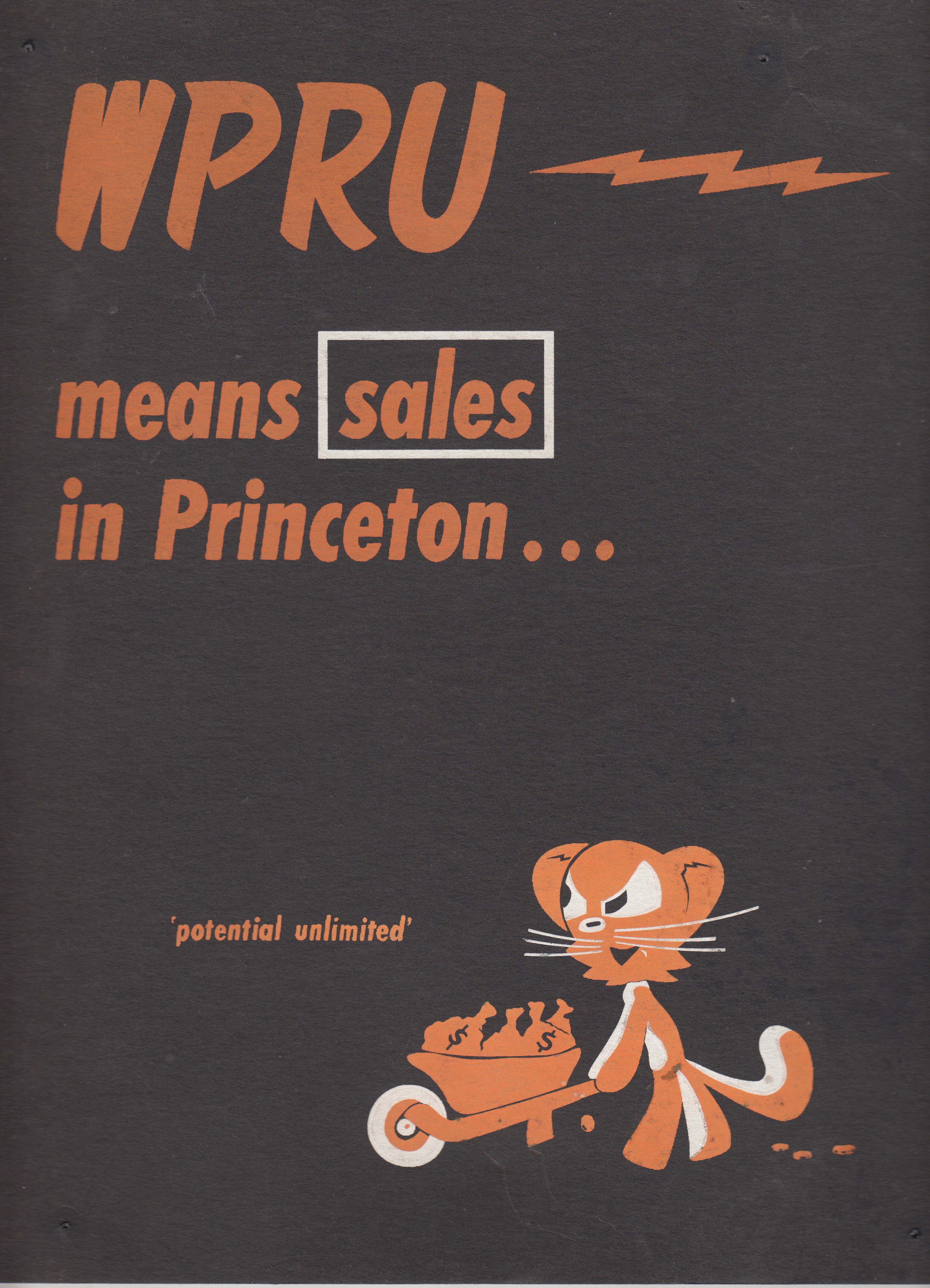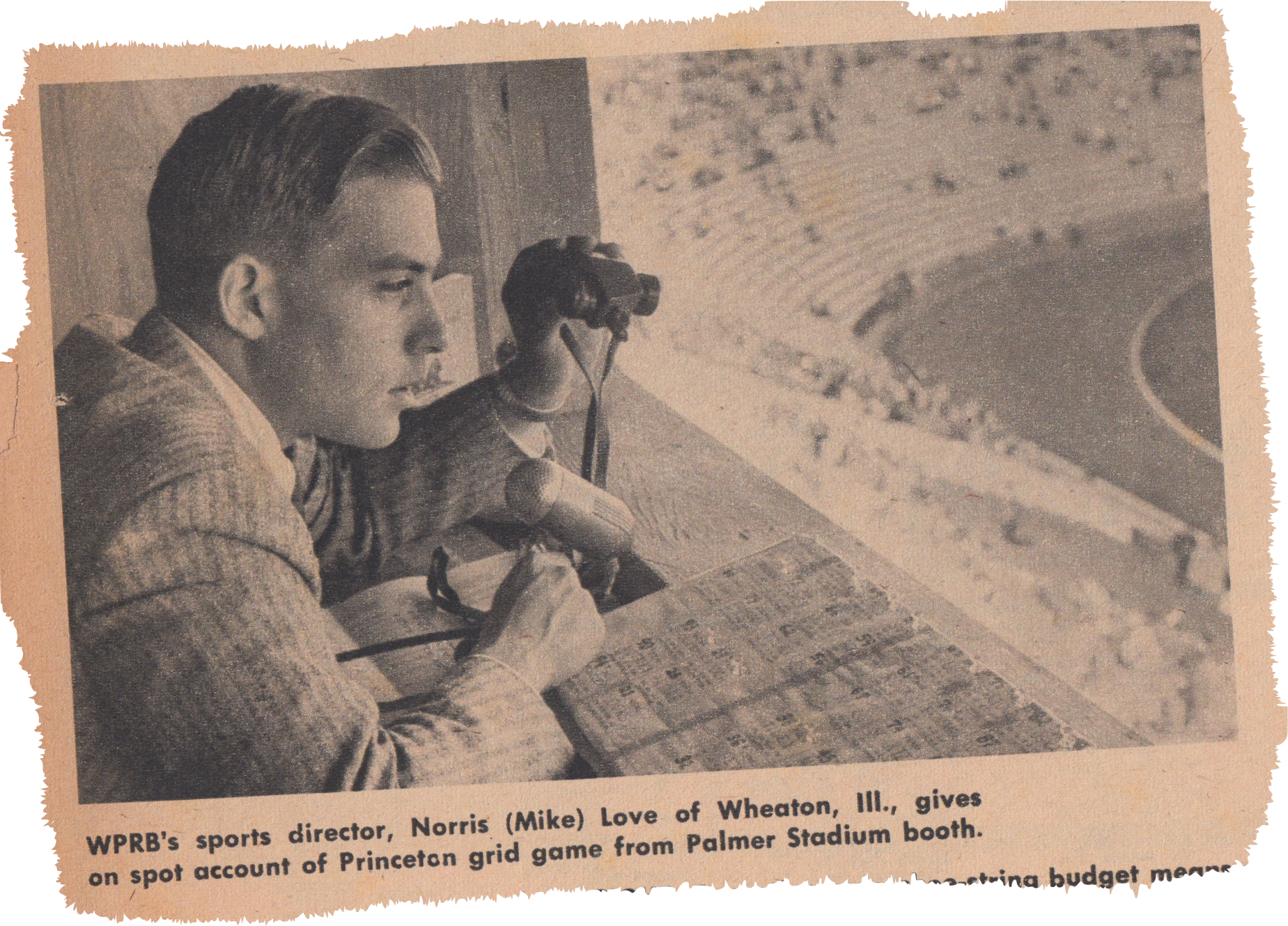WPRB as “The Voice of the Campus”, by Paul Dunn

Working at WPRU or, in fact, having anything to do with broadcasting was the farthest thing from my mind the first time I entered the station in the early fall of 1954. I was simply fleeing from a group of sophomores who were trying to steal my beanie, which all freshman had to wear then. Holder Hall was the sophomore dorm, but we had to pass through this enemy territory to get to the Commons to eat. A month or so later, a few of my friends and I came up with the idea that WPRU, which, at that time, didn’t sign on till 8 pm Sundays, should have a classical music program Sunday afternoons. We had met some members of the station — Art Hulnich ’57 comes to mind — and we proposed the idea of a Sunday afternoon program called Sunday Sketchbook, and it was eventually accepted. It was not long till I was thoroughly addicted to life in the basement of Holder.
Dreams of medical school evaporated and for the remainder of my undergraduate days, my life revolved around WPRU/WPRB and the friends I made there. Many of these friends have stood by me through thick and thin in the third of a century which has passed. Obviously, I have too many memories of WPRU/WPRB during my undergraduate years to tell. I could fill a book, but would probably bore most who read it. So, here are but a few recollections:
When I was a freshman (1954-55), the undergraduate board was headed by Robert B. Yegge ’56. Bob never appeared at the station without a coat and tie. Although we did not call him Mr. Yegge, we held him in awe. Tech Director John Shinley ’56 and Program Director Jack Aponick ’57 were more accessible to the freshman, and they were our prime teachers. During the spring of ’55, the FCC virtually shut WPRU down because the closed circuit transmitter in Pyne Hall was not only off the 640 frequency, but it was being run at such power that the signal jumped onto the Pennsylvania Railroad tracks and could be heard miles off campus. The story of the Atlanta, Georgia listener inquiring about what happened to the station is probably a bit exaggerated. Nevertheless, power was drastically reduced and for months reception was limited to Pyne and parts of ’01.
The tech department experimented with “black boxes”, small transmitters in all the dorms. John “Dopey” Norton ’55, David Meginity ’58 and Ned Irons ’58 did their best to perfect the system, but my lasting impression is of a black box at the station transmitting for a few minutes before its transformer exploded. As the black smoke billowed, one of the engineers said that theoretically, that hadn’t happened.
In the fall of 1955, WPRU became the country’s first commercial FM undergraduate radio station with the new call letters WPRB. (The PRU call letters were assigned to the aircraft carrier Princeton.) The first major remote broadcast was the Brown football game from Providence. Ma Bell’s phone lines had a hum which grew so loud you couldn’t hear Carl Peterson’s (’56) play-by-play. Repeated calls to the phone company produced no results until, near the end of the first half,’the hum and all audio disappeared, followed by some voice saying, “I don’t see any problem here.”
The Peacock Inn served many station needs — and underage undergraduates. Once a week, we broadcast the Nassoons live from the Peacock Alley. These broadcasts were discontinued sometime in early 1956.
Advertising sales never kept up with expenses, even though we had regular sponsors like the First National Bank, which sponsored the 11 pm news (a fifteen minute newscast) and Lucky Strike Cigarettes, which sponsored the 5 pm news. It was always hard to get people to service accounts, and advertising copy was usually updated by announcers who would change lines like “on warm fall nights” to “on cold winter evenings…”

In 1956, my roommate and later Station Manager Dick Morgan and I decided that a major publicity stunt was needed to begin fall broadcasting. Without, of course, cluing in our parents who thought they were paying for an education, we decided to go after the world’s record for the longest two-man radio show. We signed on at noon on an early September Friday with the announced intention of staying on for 100 hours. Six hours later, my father called from New York, insisting we stop. He had read about the marathon in the World Telegram on his subway ride from work. Parental advice carried as much weight then as it does now, and, somehow, Dick and I completed the broadcast at 4 pm the next Tuesday afternoon. We could not have done it without an incredible amount of help from countless friends, including, of course, our roommates Dave Smith and Benji Horne. During the program, we took requests, and even rock ‘n roll lover Morgan had had enough of Elvis Presley’s “Don’t be Cruel” and “Hound Dog”. Rock was just beginning in those days, and Dick Morgan featured it on his daily Spins & Needles show. I stayed with Sinatra and Como on The Music Shop. Bill Pierce ’57, one of the station’s best announcers featured artists like Ella on Club 640, the weekly Friday evening show from 11:15 to 1:00 am, a show I later inherited and then handed over to Kurt Medina ’60. Club 640 was preceded Friday evenings by You’re the Tops with the theme song by Les Brown.
Perhaps the finest announcer on the station, Carroll (“C.J. your D.J.”) James ’58 hosted the program. News was an important part of our programming. Sam Trump’s deep bass announced the Rock Around the Clock riot in the spring of ’55, and Jim McGiffert ’59 had a field day covering stories about Alger Hiss‘ campus visit in the spring of ’57. Hiss’ appearance had created a furor throughout New Jersey, and the University feared trouble the night of his speech from Whig Hall. WPRB was asked to broadcast what turned out to be a very dull talk, and I remember walking around the campus that evening hearing the broadcast from almost every open window. The previous night, I had crouched behind bushes outside Whig Hall waiting for demonstrators. With me was the editor of The Daily Princetonian, one Johnny (R.W.) Apple.
Another news event stands out: The 1956 election. We were determined to provide coverage of the results from throughout New Jersey. However, because we could not afford remote radio phone lines to places like Trenton, New Brunswick and Newark, we decided to use the telephone. In those days, that was unheard of because no broadcaster was willing to air anything lacking studio quality. Of course, listeners didn’t object, and our election broadcast resulted in high praise.
[I remember] Ric (P.K.) Laurence mopping up floods in Studio A, sacking out on the studio couch during summer renovation projects and watching silver dollar size cockroaches parade across the floor. Dopey Norton checking my room in Pyne each night to make sure I was studying, Skip Mcguire ’59 infuriating the senior board when, as a freshman, he took the 77 DX mic for the Nassoons broadcast, Bill Clarkson’s (’58) great news announcing, Dave Dunn’s (’59), and Howie Sussman’s (’58) excellent classical music programming, and struggling to get the Strictly for the Birds morning show on at 6:40 am.

Also: Kit Cone ’58 repairing mic cords, Mike Love ’58 doing play-by-play, Fred Sillman ’58, my regular engineer (we didn’t combo in those days), treating the records and tapes with the finesse he would later exhibit as a surgeon. Remote broadcasts, trips to places like Dartmouth in the Black Beauty, my 1940 Buick which served as the station car, using the first transistor remote unit (built by Meginity and Irons) at the Brown gym, much to the envy of the CBS engineer in the next booth, completing a license renewal application at 5 am, and, finally, late in the afternoon of June 17, 1958 hours after our graduation, sitting in the silent control room with Fred Sillman not wanting to end four incredible years. Many years have passed since I was first chased into WPRU. My wife and children have tolerated my innumerable trips back for trustees meetings, but only those who shared the WPRU/WPRB experience can appreciate what the Princeton Broadcasting Service can mean. Certainly, what I learned about broadcasting has served me well in professional life in commercial radio and, now, public television and radio. But the real value was the human experience, learning to work with others, and the realization of the true meaning of friendship.
Newspaper images from the Newark Sunday News, November 17th, 1957.
